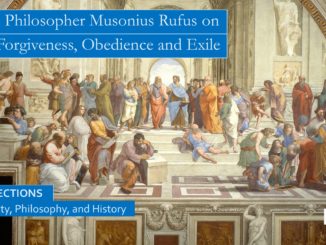
Musonius Rufus, Stoic Philosopher, Forgiveness and Obedience
When someone wrongs us, should we file suit, or should we forgive and forbear? Rufus explores this topic in his lecture on whether a philosopher should file a suit when assaulted. He tells us that “those who do not know what is really good and what is really shameful, and who are overly concerned with their own fame, these people think that they are being injured if someone glares at them, laughs at them, hits them, or mocks them. But a man who is thoughtful and sensible, as a philosopher should be, is disturbed by none of these things.” […]

